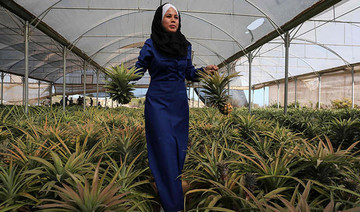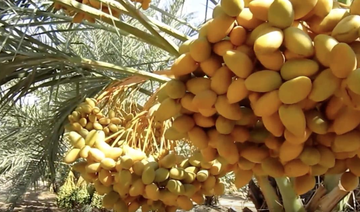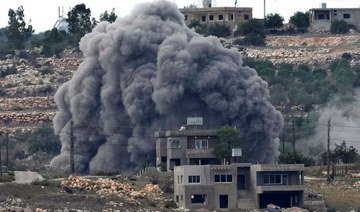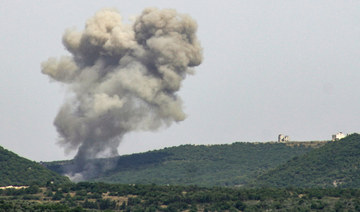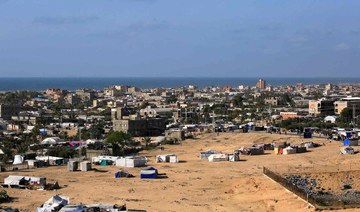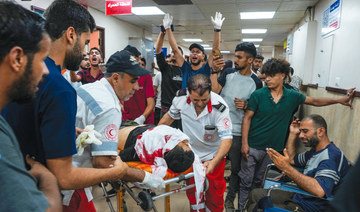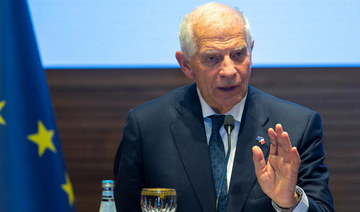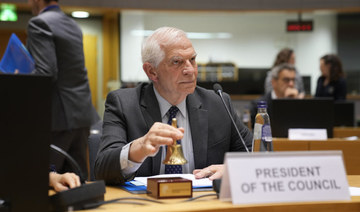NABLUS, Palestinian Territories: Palestinian farmer Mahmud Abu Shinar surveys two rows of severed olive trees — something he says has become a sadly familiar sight.
He didn’t see who took a chainsaw to them at night, but he blames residents of an Israeli settlement a few hundred meters (yards) away.
“We came on Sunday and were shocked that all these trees were cut down,” Abu Shinar said.
“I called the landowner. They came and the (Israeli) army and security forces came too. But of course, it was useless.”
Olives are perhaps the most well-known and abundant Palestinian product, with trees lining valleys and terraced hillsides throughout the occupied West Bank.
The first rains after the hot summer months are the signal for farmers to begin harvesting their crop, but it can come with risks.
In many places, farmers say they face intimidation and violence from nearby settlers and call in support from foreign and Israeli supporters, including Jewish rabbis, to protect them and their crops.
Some of the incidents are seen as attempts at revenge following Palestinian attacks on Israelis, even if the farmers targeted were not involved.
In other cases, say rights groups, there is little motivation other than just to destroy Palestinian property.
Some rights groups have distributed video footage of such incidents in a bid to pressure Israeli authorities to act.
Israeli settlers charge that their crops have also been damaged by Palestinians, including an incident in May when around 1,000 grapevines were allegedly destroyed.
More than 7,000 Palestinian-owned trees have been vandalized so far this year, according to the United Nations.
In the whole of 2017, it was less than 6,000, the year before only 1,600.
Abu Shinar said that in recent weeks around 200 trees had been destroyed in fields he works on near Ramallah in the central West Bank, costing thousands of dollars in lost earnings.
“They want the land,” he said, of the settlers. “Who else would come and commit a crime like this?”
The body that represents West Bank settlements said there was also an increase in attacks on Israeli-owned farms, labelling it “agricultural terror.”
Israeli police said they were “investigating a number of incidents when damage was caused to olive trees.”
“There have also been a number of complaints made by Jewish owners of fields of damage caused to olive trees.”
Patrols have been stepped up, police spokesman Micky Rosenfeld said.
But rights groups charge that Palestinian crops have long been vandalized by settlers without any serious effort by the authorities to stop it.
Around 400,000 Israelis live in settlements that dot the West Bank and range in size from large towns to tiny hamlets.
The international community considers them illegal.
A few dozen kilometers north of Abu Shinar’s trees near the city of Nablus, a small group huddles under a tree, picking through the leaves for olives.
Just 10 meters away stands an abandoned house daubed with Hebrew graffiti, while the Israeli settlement of Har Brakha is over a hill.
Israeli forces patrol the area, with one soldier telling the Palestinians they are “there to help.”
But the farmers said that two days earlier settlers had run down and damaged trees. They claimed the army is often slow to react and sides with settlers.
They invite international and Israeli supporters to attend the picking season to help protect themselves.
Retired British woman Caroline, who declined to give her full name, said she had been coming each year for a decade to work with Palestinian communities close to “particularly difficult settlements.”
This year, she said, she went with a female farmer to her land near a settlement, but the army blocked their path.
“When she eventually got into the groves, 100 of her trees had been chainsawed down by settlers. There weren’t even any olives for us to pick,” she said.
Rabbi Gil Nativ makes sure to wear his kippa cap as he picks olives to show Palestinians not all Jews support Israeli settlement expansion.
“Some (Israelis) consider us as traitors,” said Nativ, who volunteers for the Rabbis for Human Rights organization.
“For me the main principle of the Jewish faith is all men are created in the image of God and all human beings are descendants of the same Adam and Eve.”
Yigal Dilmoni, CEO of the Yesha Council which represents Israeli settlements, said in a statement to AFP that they “deplore all acts of vandalism and purposeful destruction of property.”
He highlighted a series of Palestinian attacks on Israeli settlements.
Olive tree sabotage plagues Palestinian farmers
Olive tree sabotage plagues Palestinian farmers

- Olives are perhaps the most well-known and abundant Palestinian product
- More than 7,000 Palestinian-owned trees have been vandalized so far this year, according to the United Nations
Sirens sound in Tel Aviv for the first time in months as Hamas says it fired rockets from Gaza
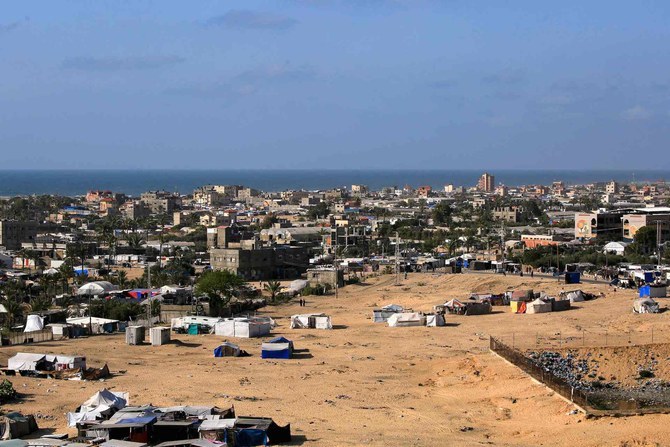
- Hamas armed wing says fired ‘large rocket barrage’ at Tel Aviv
- Aid trucks begin entering Gaza through Kerem Shalom crossing
CAIRO/TEL AVIV: Rocket sirens blared Sunday in Israel’s commercial hub of Tel Aviv for the first time in months, with at least three blasts reported across central Israel, AFP correspondents said.
The Israeli military said sirens had been activated over central Israel as fighting raged in Gaza, including in the far-southern city of Rafah.
The armed wing of Palestinian militant group Hamas said it had launched a “large rocket barrage” on Tel Aviv.
The Ezzedine al-Qassam Brigades said in a post on Telegram that they had targeted Tel Aviv “with a large rocket barrage in response to the Zionist massacres against civilians.”
There were no immediate reports of casualties or damage from the latest barrage.
Earlier on Sunday, aid trucks entered Gaza from southern Israel through a new agreement to bypass the Rafah crossing with Egypt after Israeli forces seized the Palestinian side of it earlier this month. But was unclear if humanitarian groups would be able to access the aid because of ongoing fighting in the area.
A total of “200 trucks” had moved from the Egyptian side of the Rafah border crossing, which has been shut since early May when Israel seized the Palestinian side of the terminal, to the Kerem Shalom crossing, some 4 kilometers (2.5 miles) to the south.
Egypt has refused to coordinate aid through Rafah as long as Israeli troops control the Palestinian side.
But on Friday, Egyptian President Abdel Fattah El-Sisi agreed in a call with his US counterpart Joe Biden to allow aid through Kerem Shalom, the other entry point into southern Gaza, the White House said.
Al-Qahera News did not specify how many trucks had made their way through inspection into besieged Gaza, but said “four fuel trucks” had already crossed and were heading to hospitals.
All aid from Egypt is inspected by Israeli authorities and distributed via the United Nations.
The remainder of the 200 trucks were “expected to cross into Gaza today,” Khaled Zayed, head of the Egyptian Red Crescent in Al-Arish — where the bulk of aid arrives — said.
Drones kill 3 as Israel widens southern Lebanon attacks
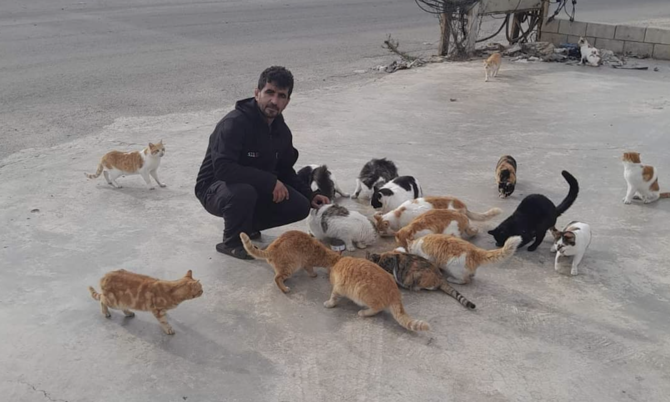
- Strike near UN peacekeeping base in Naqoura kills Hezbollah member
- ‘We are waiting for you,’ Lebanese MP says after Israeli threat of ‘open war’
BEIRUT: Three people, including two civilians, were killed in drone strikes on Sunday as the Israeli army stepped up its attacks on Hezbollah and its ally in southern Lebanon.
The first strike, near a UNIFIL site in Naqoura, killed a Hezbollah member later identified as Mohammed Baydoun.
A second Israeli drone targeted a motorcycle in Aita Al-Shaab, killing a civilian named as Rafik Hassan Kassem, and badly injuring another man, Hussein Saleh, who later died from his wounds.
Saleh, a mechanic with no political affiliations, used to travel to nearby towns to feed domestic animals left behind by owners who fled the region. Arab News had previously interviewed him.
People close to Saleh said that “everyone advised him to stop visiting border villages in fear of being targeted, but he insisted on fulfilling his humanitarian duty.”
An Israeli drone also struck Jabal Al-Blat, opposite Israel’s Zar’it settlement, targeting a transmission tower for Hezbollah’s Al-Manar TV Channel.
As hostilities between Hezbollah and Israel entered their 231st day, Khiam village was subjected to heavy Israeli raids, with military drones striking four targets.
In less than 48 hours, Israeli shelling reached the outskirts of Chihine, Majdal Zoun, Kfarhamam in Wadi Hamoul, Zebqine, and Naqoura.
Shelling subsequently reached the villages of Rachaya Al-Foukhar, Hamoul, Zebqine, Labbouneh, the Makraba forest, and the eastern outskirts of Khiam.
A fire erupted after a number of shells landed on the outskirts of Rab Al-Thalathine, near Al-Taybeh village.
Israeli raids on Aita Al-Shaab in the central sector caused serious damage to property, infrastructure and homes.
Hezbollah also announced the deaths of two people in Israeli raids on Aitaroun late on Saturday night.
One of the victims was named as Bilal Amin Mourad, a former principal in the Aitaroun public vocational school. Caretaker Minister of Education Abbas Halabi mourned Mourad’s death on Sunday.
Israeli army spokesperson Avichay Adraee said that the military struck Hezbollah targets in five regions in southern Lebanon.
He said that warplanes raided Hezbollah’s infrastructure and military buildings in Khiam and Aita Al-Shaab, adding that several areas in Khiam, Houla, Markaba and Kfarkila were also bombed.
Sirens sounded in Israeli settlements adjacent to the Lebanese border, including Shlomi, Betzet, Hanita, Ras Naqoura in western Galilee, Avivim in the upper Galilee, and Kiryat Shmona and its surroundings.
Meanwhile, missiles landed in an Israeli army site near Shlomi.
Israeli Army Radio announced that “two anti-armor missiles were launched from Lebanon toward Margaliot in the Galilee panhandle.”
The Israeli Channel 12 said “about 10 missiles were launched from Lebanon toward the Zar’it settlement in the upper Galilee, with no casualties reported.”
Hezbollah’s operations targeted “technical systems in the Israeli Al-Abad site with appropriate weapons, striking it directly and completely destroying it.”
The militant group also struck “a Merkava tank with a direct missile in the Al-Marj site, destroying it and killing and injuring its members.”
It subsequently targeted the Zibdine site in the Shebaa farms and a building for the Israeli soldiers in the Al-Manara settlement. It also hit two buildings for the Israeli soldiers in the Metula settlement and two other buildings for the Israeli soldiers in the Shtula settlement.
MP Mohammed Raad, head of Hezbollah’s parliamentary bloc, responded on Sunday to Israeli statements threatening to wage open war on Lebanon, saying: “We know your situation accurately, and we know who you are and we are waiting for you.”
In response to those criticizing the attacks in southern Lebanon in support of the Gaza Strip, Raad said: “When criminals take their crimes too far, they don’t spare anyone. That’s why we should prevent the enemy from looking for another target, so we don’t wind up being the other victims.”
Referring to the kamikaze drones used to strike Israeli targets, Sheikh Nabil Kaouk, a member of Hezbollah’s Central Council, promised further operations that will “surprise and humiliate the enemy.”
He said: “For the first time in the history of the Arab-Israeli conflict, Lebanese planes raid Israeli sites in occupied Palestine.”
Recognizing Palestinian state is ‘justice’ for Palestinians: Spain

- Welcoming Spain’s move to recognize the Palestinian state on Tuesday, Mustafa said: “We want to have every country in Europe to do the same”
BRUSSELS: Recognizing the State of Palestine “is justice for the Palestinian people (and) the best guarantee of security for Israel,” Spain’s foreign minister Jose Manuel Albares said Sunday alongside Palestinian prime minister Mohammed Mustafa.
Welcoming Spain’s move, with Norway and Ireland, to recognize the Palestinian state on Tuesday, Mustafa said, “We want to have every country in Europe to do the same.”
Albares and Mustafa spoke side-by-side in Brussels, where the Palestinian leader was also meeting EU foreign policy chief Josep Borrell and Norwegian Foreign Minister Espen Barth Eide.
Later Sunday, Mustafa was to have further talks with Borrell, Barth Eide and Saudi Foreign Minister Prince Faisal bin Farhan.
On Monday he will have another meeting in Brussels with the Spanish, Norwegian and Irish ministers. And on Wednesday he will be in Spain.
Israel has warned Spain, Norway and Ireland that ties with them will face “serious consequences” for their announced recognition of a Palestinian state.
Israel’s devastating war in Gaza in retaliation for Hamas’s October 7 attack has given impetus to countries wanting recognition of the State of Palestine.
They hope that the steps toward a long-elusive two-state solution, with Israel and a Palestinian state, will build foundations for Middle East peace.
A majority of UN member countries recognize Palestinian statehood. European countries are split on the issue.
Spain, Norway and Italy will join EU nations Bulgaria, Cyprus, the Czech Republic, Hungary, Poland, Romania and Sweden in recognizing the State of Palestine.
Mustafa said recognition of a Palestinian state addresses “the injustice that has been inflicted on the Palestinian people for decades.”
“We hope that this momentum of recognitions and initiatives will continue,” he said.
‘Strong’ Palestinian Authority needed for Mideast peace: EU’s Borrell
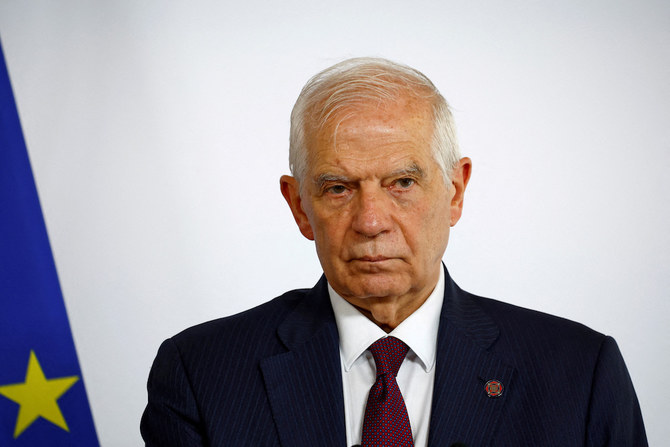
- Made comments alongside Palestinian prime minister Mohammed Mustafa
BRUSSELS: A “strong” Palestinian Authority is needed to bring peace in the Middle East, EU foreign policy chief Josep Borrell said Sunday alongside Palestinian prime minister Mohammed Mustafa.
“A functional Palestinian Authority is in Israel’s interest too, because in order to make peace, we need a strong Palestinian Authority, not a weaker one,” Borrell said.
He made the remarks to journalists just before holding talks with Mustafa on how the Palestinian administration can be built up to take over Gaza rule from Hamas.
“We see the meeting today as a very important opportunity for us as a government and new government to present our international partners with the outlines of our priorities and plans for the coming period,” Mustafa said.
The Palestinian leader said the “first priority” was to support Palestinians in Gaza, especially through a ceasefire, and then “rebuilding the institutions of the Palestinian Authority” in that territory, which Hamas seized control of in 2007.
He also called on international partners to press Israel to release Palestinian Authority funding so “we will be ready to reform our institutions... and hopefully together sustain our efforts toward statehood and peace for the region.”
The Brussels meeting, focused on international aid, was being chaired by Norwegian Foreign Minister Espen Barth Eide, in connection with the 1993 Oslo Accords that established a series of arrangements between the Palestinians and Israel.
Israel is furious with Norway, and also Spain and Ireland, for announcing they will recognize the State of Palestine on Tuesday.
ICC prosecutor says Israel not ‘akin’ to Hamas
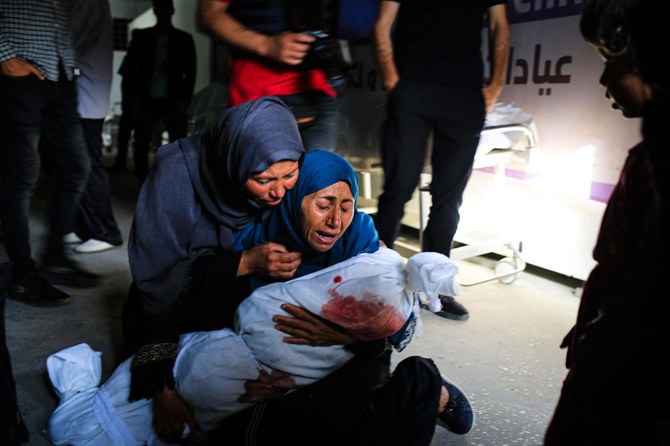
- Karim Khan: ‘Are powerful states sincere when they say there’s a body of law or is this rules-based system all a nonsense, simply a tool of NATO and a post-colonial world, with no real intention of ap
LONDON: International Criminal Court prosecutor Karim Khan justified his decision to request arrest warrants for Israel’s prime minister and defense minister in an interview with a British newspaper published on Sunday.
Khan said on Monday that he was seeking warrants for Benjamin Netanyahu and Yoav Gallant, as well as top Hamas leaders Yahya Sinwar, Ismail Haniyeh and Mohamed Deif, on suspicions of war crimes and crimes against humanity.
His announcement sparked the ire of Israel and its allies the United States and United Kingdom, all of which criticized Khan for putting together Hamas, which attacked Israel on October 7, and Israel, which has carried out a relentless military campaign in Gaza since then.
“It’s a precarious moment internationally and if we don’t hold on to the law, we have nothing to cling onto,” Khan, who rarely speaks publicly, told the Sunday Times newspaper.
He added that countries in Latin America, Africa and Asia were watching closely as to whether global institutions would seek to uphold international law.
“Are powerful states sincere when they say there’s a body of law or is this rules-based system all a nonsense, simply a tool of NATO and a post-colonial world, with no real intention of applying law equally?” Khan asked.
The warrants, if granted by the ICC judges, would mean that any of the 124 ICC member states would technically be obliged to arrest Netanyahu and the others if they traveled there.
However the court has no mechanism to enforce its orders.
Netanyahu rejected “with disgust ... the comparison between democratic Israel and the mass murderers of Hamas,” and US President Joe Biden also stressed that “there is no equivalence — none — between Israel and Hamas.”
“I am not saying that Israel with its democracy and its supreme court is akin to Hamas, of course not,” Khan added in his interview.
“I couldn’t be clearer, Israel has every right to protect its population and to get the hostages back. But nobody has a license to commit war crimes or crimes against humanity. The means define us.”
He cited a number of allegations against Israel, including “the fact that water was turned off... that people queuing for food [were] targeted, that people from aid agencies have been killed.”
“This is not how war is supposed to be waged,” said Khan.
“If this is what compliance with international humanitarian law looks like, then the Geneva Conventions serve no purpose.”
The Gaza war broke out after Hamas’s unprecedented attack on October 7 resulted in the deaths of more than 1,170 people, mostly civilians, according to an AFP tally of Israeli official figures.
Militants also took 252 hostages, 121 of whom remain in Gaza, including 37 the army says are dead.
Israel’s retaliatory offensive has killed at least 35,984 people in Gaza, mostly civilians, according to the Hamas-run territory’s health ministry.



